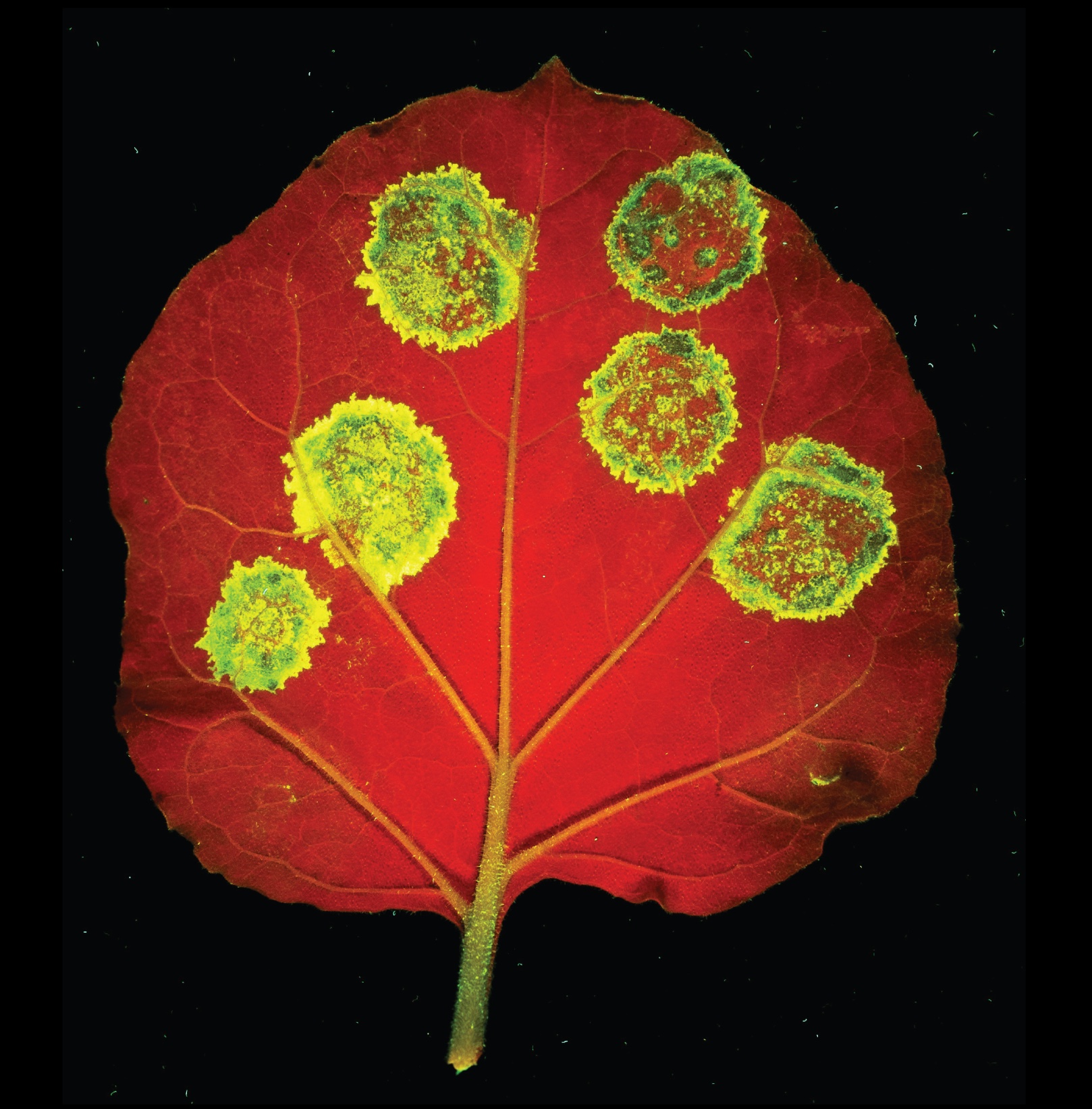OpenPlant: Engineering Plant Traits and Products
OpenPlant’s development of new foundational DNA tools and techniques allows for bio-engineering of new plant traits and products:
Altered photosynthesis and leaf structure (Workpackage F)
Changes in plant carbohydrate content (Workpackage G)
Engineering of plant metabolic pathways for production of natural products (Workpackage H)
New forms of symbiosis and nitrogen fixation for crop plants (Workpackage I)
Plant virus-based systems for bioproduction (Workpackage J)
Engineering Plant Traits and Products at a glance:
Maize Leaves by Fernan Federici on Wellcome Images, licenced under CC-BY-NC-ND 4.0
Altered photosynthesis and leaf structure (Workpackage F)
Plant leaves are biofactories that can accumulate valuable products in a number of discrete compartments both within and between cells. Furthermore, they also fine tune synthetic pathways in response to environmental signals. While significant progress has been made in defining cell specific gene expression in roots, this has not been achieved in leaves. This is a bottleneck in engineering this easily harvested organ, and there is no central repository of genetic modules to facilitate this. We aim to provide a library of elements that can be used to drive expression of both nuclear and plastid encoded genes in specific compartments of specific cells of leaves, and in addition to control that expression over the daynight cycle.
Section through Gnetum wood, confocal image: Jim Haseloff
Carbohydrate engineering (Workpackage G)
Plants provide unrivalled opportunities for provision of sugars and polysaccharides for biorefining, biofuels, animal feed, food and other industrial uses. The main goal of this workpackage is to improve the quality and increase the yield of target polymers, and to alter their structure for higher value applications. OpenPlant is funding work to build a registry of novel enzymes that could be used to alter plant cell wall polymers such as xylan, mannan and digestible glucans, and to engineering pathways for the synthesis of plant starches, which have important consequences for food quality and industrial use.
Plant production of natural products (Workpackage H)
Virus mediated gene expression in plants
(Image: Marina Pais (TSL) & Andrew Davis (JIC), from Norwich Research Park Image Library NRP-186)
Plants produce a rich and diverse array of natural products. These compounds have important ecological functions, providing protection against pests, diseases, ultravioletB damage and other environmental stresses. They are also exploited as pharmaceutical drugs, agrochemicals, within the food and drink industry, and for a wide variety of other industrial biotechnology applications. Although plants are potentially a tremendous source of diverse and valuable natural products, identifying the pathways for the synthesis of these compounds is more complicated than in microbes because the genomes are larger and more complex.
Genome sequencing studies have led to the discovery that the genes for natural products pathways are in many cases organised in operon-like clusters within plant genomes. This makes it possible to access the genes and enzymes of specialised metabolism in plants far more readily. OpenPlant supports work to harness and exploit the metabolic diversity of plants using synthetic biology approaches.
Carella et al. (2019) Figure 2B: Tissue-level expression analysis of proMpPR6a:GUS liverworts infected with P. palmivora (ARI-td) or mock-treated with water.
Biological nitrogen fixation (Workpackage I)
Nitrogen-based fertilisers are used worldwide to improve crop yields. Around 450 megatonnes of nitrogen-based fertiliser are produced annually, consuming 3-5% of the world's annual supply of natural gas. Nitrogen fixation is found naturally in highly specific associations between Rhizobia bacteria and legume plants. The transfer of this symbiotic association to cereals is a major strategic challenge in plant biotechnology, with profound potential benefits for sustainable agriculture.
OpenPlant has initiated an engineering strategy to transfer the recognition of rhizobial bacteria from legumes to cereals, as the first step towards engineering N-fixing cereal crops. This is a strategically important challenge and this Gates- and BBSRC-funded programme represents one of the most ambitious engineering strategies in plant signalling. Marchantia provides a fantastic platform for testing synthetic biology approaches in engineering symbiosis signalling that is directly linked to a strategic programme in cereals.
The process of agroinfiltration. At the John Innes Centre on the Norwich Research Park, Nicotiana benthamiana plants are syringe infiltrated with suspensions of Agrobacterium tumefaciens harbouring a plasmid designed to express a foreign gene within the infiltrated leaves. High level expression normally occurs within one week. (Image credit: George Lomonossoff and Eva Thuenemann (JIC), from Norwich Research Park Image Library, NRP-134)
Plant virus-based systems for bioproduction (Workpackage J)
The CPMV-HT (Cowpea Mosaic Virus-HyperTranslatable) expression system, developed by Prof George Lomonossoff and Dr Frank Sainsbury at the John Innes Centre, has established a unique position for the UK for rapid transient expression of proteins in plants, through Agrobacterium-mediated infiltration of Nicotiana benthamiana leaves. The technology is powerful and was used under licence by the Canadian company Medicago to produce 10M effective doses of H1N1 (swine flu) VLP Vaccine in just 30 days, while the traditional route would have taken 9 – 12 months. Taking a synthetic biology approach, researchers at the OpenPlant are finding the CPMV-HT technology highly amenable for testing prototype plant natural product biosynthetic pathways, and for the actual production of high-value chemicals and bioactive proteins. The CPMV-HT is a highly flexible system and is being adopted for a range of applications in the field of plant synthetic biology.






